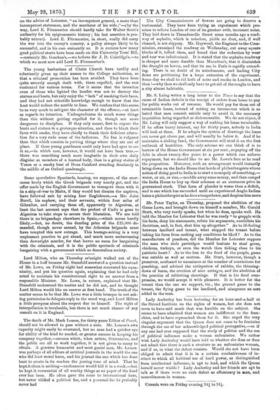Mr. S. Laing writes a long letter to the Times
to say that the cause of Indian deficits is the receipt of orders from home to pay for public works out of revenue. He would pay for them out of terminable loans, instead of raising an income-tax which is so hated that men commit suicide only to avoid it, the necessary inquisition being regarded as dishonourable. We do not object, if Mr. Laing will only suggest a way of making his loans terminable. If he offers heavy interest, say for thirty years, nobody in India will look at them. If he adopts the system of drawings the loans can never get above par, and will usually be below it. And if he maintains a sinking fund, the Government will steal it on the first outbreak of hostilities. The only scheme we can think of is to borrow of the Home Government at six per cent., so paying off the debt in about twenty-five years to a power which can enforce repayment, but we should like to see Mr. Lowe's face as he read the proposition. Moreover, such an arrangement would instantly bring down on the India House that horde of philanthropists whose notion of doing good to India is to start a monopoly of something,— water, or air, or rice,—muddle away some money, and then compel the India House to buy up their schemes at an enormous price in guaranteed stock. That form of plunder is worse than a deficit, and is one which has succeeded until an experienced Anglo-Indian hates a philanthropist as he does a taxgatherer, and despises him more






























 Previous page
Previous page